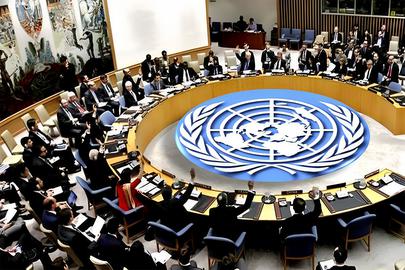The morning of October 19, London time, and hours after midnight in Tehran, marked the eighth anniversary of the adoption of the Joint Comprehensive Plan of Action (JCPOA) by the Islamic Republic of Iran, the United States and the European Union.
Eight years ago on this day, the restrictions outlined in United Nations Security Council resolution 2231 concerning the ballistic missile program of the Islamic Republic were lifted.
However, the anticipated subsequent events did not unfold as expected. In fact, both the United States and the European Union took actions that were contrary to the agreement.
The JCPOA was a temporary agreement involving the Islamic Republic of Iran and the permanent members of the United Nations Security Council, along with Germany.
This deal was designed to gradually lift the prescribed restrictions over a span of 25 years, contingent upon Iran's compliance with its obligations.
By the eighth year of the agreement, the United Nations sanctions related to Iran's ballistic missile program were set to terminate.
While the JCPOA was initially put into practice, all Security Council and EU sanctions were lifted as specified in the agreement and Resolution 2231.
However, certain limitations, such as those pertaining to the trade of dual-use goods, weapons and conventional weaponry, were to remain in place until October 19, 2023.
At 00:00 GMT on that day, these restrictions were set to expire.
As projected, the UN sanctions ended on that day. However, the United States, the EU, Canada, the United Kingdom and Australia declared that Iran had not adhered to its obligations over the past eight years.
They codified this stance into their respective laws and decided to uphold it in opposition to the Islamic Republic of Iran.
Consequently, the restrictions laid out in Resolution 2231 concerning Iran’s ballistic missile program, as well as dual-use goods and conventional weapon sales persisted with the support of the 27 member states, the United States, the United Kingdom, Canada and Australia.
The Islamic Republic had repeatedly breached Resolution 2231 by conducting numerous ballistic missile tests, supplying drones to Russia for its war in Ukraine, and providing weapons to Yemen's Houthi rebels – all without the Security Council's authorization.
If the Islamic Republic had adhered to the resolution, the following developments would have occurred on October 19:
The European Union had committed to abolishing all remaining restrictions, including on individuals subject to sanctions, through the passage of a resolution in the European Council of Ministers.
This resolution was to be enacted by October 19, 2023.
The United States, which had initially lifted sanctions against Iran but later withdrew from the JCPOA during the administration of Donald Trump, was required to revoke the lifted sanctions by issuing exemptions by the same deadline.
However, this commitment was nullified when the United States' withdrew from the JCPOA.
Iran had undertaken to present the official accession bill to the International Atomic Energy Agency's (IAEA) Additional Protocol to parliament for approval by October 2023.
This protocol had been adopted on a trial or voluntary basis by the Iranian government until the start of Joe Biden's presidency.
Prior to this, IAEA inspectors had been granted access to any nuclear or suspected nuclear site, provided the Iranian government was given 24-hour notice to comply with regulations and conduct environmental sampling following approval by the Islamic Republic.
During the Trump administration, Iranian Foreign Minister Mohammad Javad Zarif proposed that Iran should submit the accession bill of the protocol to parliament several years earlier if the United States were to rejoin the JCPOA.
But on October 19, 2023, events unfolded as follows:
In accordance with its responsibilities, the United Nations Secretariat declared that, as per Resolution 2231, the restrictions that were scheduled to be lifted on October 19 have indeed been removed.
However, the previous day, the EU Council of Ministers, the Foreign Assets Control Office of the US Treasury Department, and the governments of the UK, Australia and Canada said that the sanctions outlined in Security Council Resolution 2231 would not be revoked.
Instead, they enshrined these sanctions into their respective national laws and, in practice, did not lift them.
Consequently, the sanctions on 19 individuals and 37 institutions of the Islamic Republic of Iran, which should have been terminated on October 19, will be maintained in 31 countries across the world for an indefinite period of time.
Have all Security Council Restrictions Been lifted?
Under the JCPOA and Security Council Resolution 2231, the remaining restrictions pertaining to the Islamic Republic of Iran were slated to be removed under the following timeline:
By October 2025, if the Security Council sanctions are neither reinstated nor resumed, Resolution 2231 will be entirely revoked, and the risk of re-imposing lifted UN sanctions will disappear.
Currently, should any disputes arise with Iran, there's the potential for sanctions and previous resolutions to be reinstated. However, with the cancellation of Resolution 2231, all of these constraints are poised to be eliminated.
In 2030, the Islamic Republic's commitment to promptly address IAEA concerns will expire, and by 2035, the IAEA’s monitoring of Iranian centrifuges and other uranium enrichment equipment will cease.
According to the JCPOA agreement, the Islamic Republic of Iran currently has a contract with the IAEA, under which inspectors are to monitor centrifuges for 20 years after the agreement came into force.
However, provided the agreement remains intact, this additional supervision will conclude in 2035.
Subsequently, in 2040, the IAEA's monitoring of Iran's uranium ore will also end, marking Iran’s last commitment under the JCPOA.
By that year, Iran should enable inspectors to conduct specialized inspections of all facilities producing uranium ore.
What Iran's status will be in 17 years and where the nuclear issue involving the Islamic Republic will ultimately lead remains a complex enigma that cannot be deciphered given the prevailing instability.
visit the accountability section
In this section of Iran Wire, you can contact the officials and launch your campaign for various problems
























comments